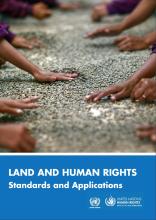/ library resources
Showing items 1 through 9 of 15.Land tenure institutions in customary land areas of Sub-Saharan Africa have been evolving towards individualized ownership. Communal land tenure institutions aim to achieve and preserve the equitable distribution of land (and hence, income) among community members.
On farm conservation of crop diversity poses obvious policy challenges in terms of the design of appropriate incentive mechanisms and possible trade-offs between conservation and productivity.
"In this paper we present the findings of a qualitative investigation into some dimensions and implications of policy volatility in the realms of natural resource (NR) governance and devolution in contemporary Sudan, with particular reference to Greater Kordofan.
This paper presents what is known about the role of agrarian reform and the subsequent counter reform in producing a successful dynamic evolution of Chilean agriculture.
This research has been undertaken to improve our understanding of stakeholders’ knowledge and perception about ecosystem services (ES), which provides a valuable means of gaining insight into the opportunities and constraints that face ES management in a multiuser landscape.
These principles provide guidance on ways to align business objectives with the safeguard of human rights.
The United Nations Declaration on the Rights of Indigenous Peoples (UNDRIP) is the most comprehensive international instrument on the rights of indigenous peoples.
This basic legal reference publication has been prepared as part of the OHCHR output on land and human rights.
Pagination
Land Library Search
Through our robust search engine, you can search for any item of the over 73,000 highly curated resources in the Land Library.
If you would like to find an overview of what is possible, feel free to peruse the Search Guide.







